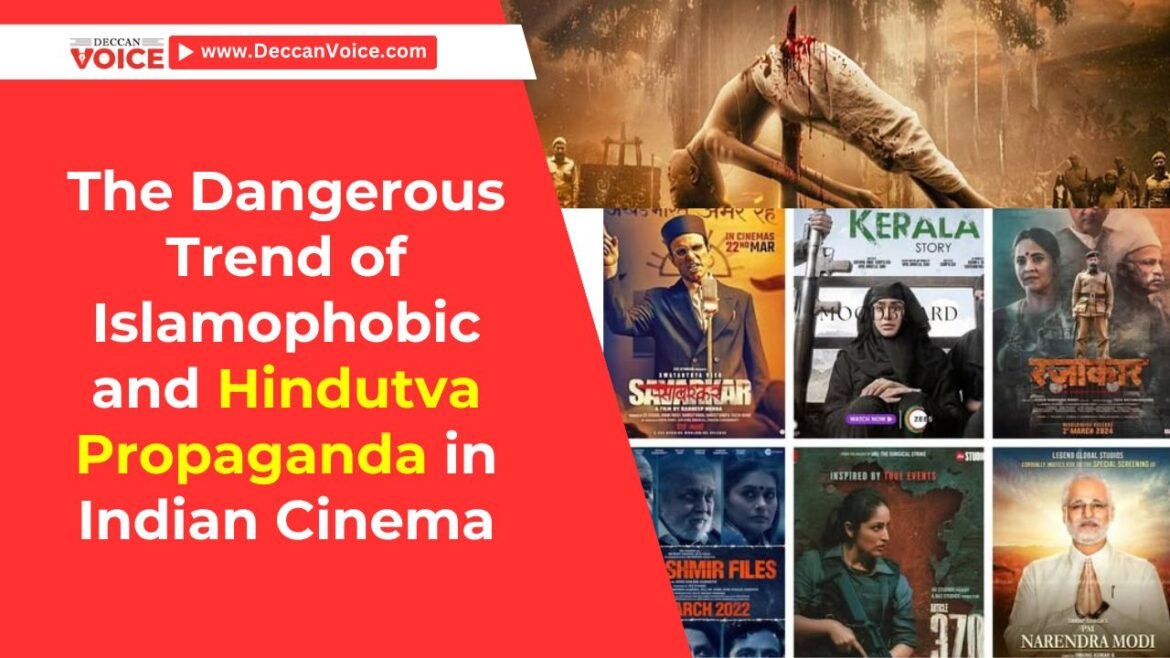Table of Contents
In recent years, Indian cinema has witnessed a disturbing trend—films that deliberately distort history, vilify Muslims, and promote the Hindutva agenda under the guise of “nationalism” and “historical truth.” Movies like The Kashmir Files, The Kerala Story, Chhava, and now Hari Hara Veera Mallu are not just works of fiction; they are calculated attempts to rewrite history, fuel communal hatred, and justify the persecution of Muslims in India.
Manufacturing a False Narrative of Muslim “Oppressors”
One of the most insidious tactics employed by these films is the portrayal of Muslim rulers as barbaric tyrants while glorifying Hindu kings as flawless heroes. Films like Chhava (based on Chhatrapati Sambhaji) and Hari Hara Veera Mallu (reportedly depicting Aurangzeb as a villain) follow a predictable formula: Muslim rulers are shown as cruel invaders, while Hindu figures are painted as noble defenders of faith. This binary is not just historically inaccurate but also politically motivated.
History is complex—many Muslim rulers, like Akbar, Tipu Sultan, and Zain-ul-Abidin of Kashmir, were known for their administrative skills, religious tolerance, and cultural contributions. Conversely, many Hindu kings engaged in warfare, caste oppression, and political betrayals. But Hindutva propaganda erases nuance, reducing centuries of history to a simplistic “Hindu vs. Muslim” conflict where Muslims are always the villains.
The Kashmir Files and Kerala Story: Hate-Mongering Disguised as Cinema
The Kashmir Files and The Kerala Story claim to expose “truths” but are filled with exaggerations, fabrications, and Islamophobic tropes. The Kashmir Files reduced the complex Kashmir conflict to a one-sided Hindu victimhood narrative, ignoring the suffering of Kashmiri Muslims at the hands of both militants and the Indian state. Similarly, The Kerala Story peddled the absurd conspiracy that Muslim men systematically convert Hindu women to Islam—a narrative debunked by fact-checkers but widely promoted by BJP leaders.
These films are not entertainment; they are propaganda tools designed to justify anti-Muslim policies like the Citizenship Amendment Act (CAA), bulldozer justice, and mob lynchings. By portraying Muslims as perpetual aggressors, they create a moral justification for their oppression.
The Dangerous Impact of Such Films
Cinema has immense power to shape public perception. When films repeatedly depict Muslims as villains, it normalizes hatred and violence against them. We have already seen how hate speech and fake news have led to lynchings, riots, and discriminatory laws. Movies like these further polarize society, making reconciliation impossible.
Moreover, this trend stifles genuine historical discourse. Instead of engaging with India’s pluralistic past, filmmakers are reducing history to crude propaganda. If this continues, future generations will grow up with a warped understanding of their own heritage.
Conclusion: Cinema Should Unite, Not Divide
Art should challenge, provoke, and enlighten—not spread hatred. The rise of Hindutva propaganda films is a dangerous development that threatens India’s secular fabric. Instead of making films that demonize an entire community, Indian cinema should focus on stories that reflect the country’s diversity and shared history.
It’s time to call out this toxic trend before it does irreversible damage. The question is: Will the Indian film industry stand for truth and harmony, or will it continue to be a mouthpiece for hate?



